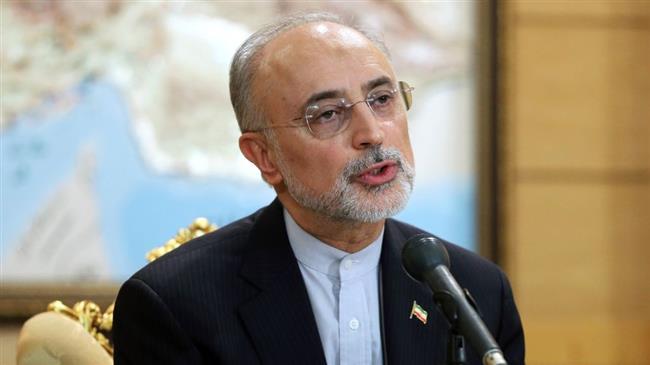US’ ‘embedded irrationality’ eroding optimism in JCPOA: Iran’s nuclear chief
The head of the Atomic Energy Organization of Iran (AEOI) says unilateral withdrawal of the United States from a landmark and multilateral nuclear deal with Iran, officially known as the Joint Comprehensive Plan of Action (JCPOA), has undermined the agreement, which could serve to prove that diplomacy is the most viable option for tackling toughest international issues.

Ali Akbar Salehi made the remarks while addressing the “International Conference on Nuclear Security: Sustaining and Strengthening Efforts” in the Austrian capital, Vienna, on Monday.
“It was a dominant belief that the JCPOA could set a model in this regard …. But, unfortunately, this euphoria didn’t last long. With the embedded irrationality in the US administration’s mindset, such optimism is fading away so quickly,” he said.
He urged Europe, as a main stakeholder of the deal, to play its role in keeping the JCPOA alive through living up to their commitments without paying heed to the US administration’s “unjust pressures.”
“Unfortunately, the US administration has not yet come to its senses in recognizing the reality on grounds and keeps on inflicting harm on our people as well as the people of the entire region while creating and supporting terrorist groups such as ISIS (Daesh),” Iran’s nuclear chief added.
The JCPOA, better known as the Iran deal, was signed between Tehran and six major world powers — the United States, Britain, France, China, Russia and Germany — in 2015 and has been ratified in the form of a United Nations Security Council resolution.
But US President Donald Trump, a stern critic of the landmark deal, unilaterally pulled Washington out of the JCPOA in May 2018, and unleashed the “toughest ever” sanctions against the Islamic Republic in defiance of global criticism in an attempt to strangle the Iranian oil trade.
Under Washington’s pressure, the three European signatories to the JCPOA have so far failed to protect Tehran’s business interests under the deal against the American bans.
This May, Iran began to gradually reduce its commitments under the JCPOA to both retaliate for Washington’s departure, and trigger the European trio to respect their obligations towards Tehran.

Iran announces decision to take fifth step to scale back JCPOA commitments Iran announces its decision to take the fifth and final step in reducing its commitments under the 2015 nuclear deal.
On January 5, Iran took a fifth step in reducing its commitments, and said it would no longer observe any operational limitations on its nuclear industry, whether concerning the capacity and level of uranium enrichment, the volume of stockpiled uranium or research and development.
Elsewhere in his speech, Salehi said as a member state to the nuclear Non-Proliferation Treaty (NPT), Iran maintains that in line with Article IV of the NPT, nothing “shall be interpreted as affecting the inalienable right of all the parties to the treaty to develop research, production and use of nuclear energy for peaceful purposes without discrimination.”
The AEOI head emphasized that nuclear security and safety measures must be utilized to support such objectives and functions.
Late last month, a group of Iranian lawmakers submitted a motion to the parliament calling for the Islamic Republic’s withdrawal from the NPT after the three European signatories to the JCPOA failed to meet their contractual commitments following the US’s exit.

Motion for Iran to withdraw from NPT submitted to ParliamentA group of Iranian lawmakers submit a motion to the Parliament calling for Tehran
A member of the Iranian Parliament’s Presiding Board, Mahmoud Sadeqi, said that the motion had been prepared after the European trio triggered a dispute mechanism devised in the deal, which could lead to the restoration of UN Security Council Sanctions against Iran.
Salehi further said the International Atomic Energy Agency (IAEA) is expected to assist its member states “upon their request and on a non-discriminatory basis, in their efforts to enhance a sustainable nuclear security regime based on their national needs and priorities.”
Iran believes that “nuclear security activities of the Agency should be funded with no string attached by the donors,” he added.
“Iran has taken upon itself to enhance further the mechanisms of its nuclear security throughout the country, through its own resources and also by utilizing the agency (IAEA) and other member states’ potentials,” the Iranian nuclear chief said.
He emphasized that the Islamic Republic is updating the regulations regarding the security of radioactive sources and the relevant guidance on control and combating illicit trafficking of radioactive and nuclear materials.







